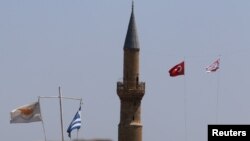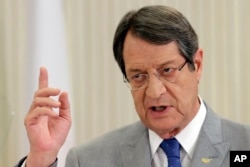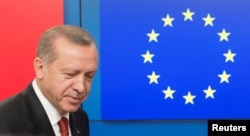As expected, both sides are blaming the other for the collapse of the latest Cyprus peace talks which diplomats saw as the best chance yet to reunify the divided island.
Greek Cypriot President Nicos Anastasiades said Monday that Turkey's insistence on keeping Turkish forces deployed in the northern part of the island caused the talks to break down. He said Cyprus must be truly independent and sovereign, free from "dependence on third countries."
Turkish President Recep Tayyip Erdogan says it was the "negative attitude" of the Greek Cypriots, saying the Turkish north brought a "constructive approach" to the talks. He also warned companies planning to search for oil and gas in the Mediterranean off Cyprus that they risk "losing a friend like Turkey" if they go ahead with their plans.
Oil and gas exploration off Cyprus is one of the major issues holding up a peace deal. Turkey insists that any energy finds belong to both sides of the island.
The internationally-recognized Greek Cypriot south says it has sovereignty over the waters and the right to exploit it.
Cyprus has been split between a Greek Cypriot south and Turkish Cypriot north since 1974. Turkish troops invaded in response to a coup in Nicosia aimed at unifying the island with Greece.
Only Turkey recognizes a separate leadership in the north while the Greek side enjoys the benefits of European Union membership and global recognition.
Turkish Cypriots insist the Turkish forces stay on the island for what they say would be their protection. The Greek side wants them gone, believing the soldiers to be unnecessary and a provocation.














